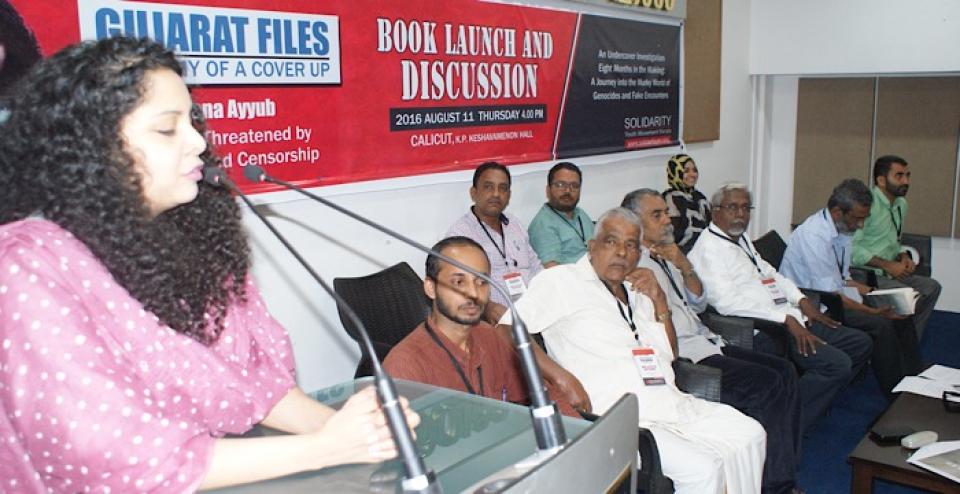
Image sourced from Wikimedia Commons. Photo by Zuhairali
Article reprinted with permission from The Print
On 22 April, prominent journalist Rana Ayyub received word of a comment circulating on Twitter that had been falsely attributed to her. The handle on which it appeared had been made to look like that of Republic TV’s, and within hours, it had gone viral, leading to a stream of vicious abuse that lasted for days, upending Ayyub’s world.
As Rituparna Chatterjee describes in her excellent piece on the attacks, the abuse and the harassment were so vicious and relentless that Ayyub could not sleep for days and feared for her safety.
In the days following the posting of the initial fake tweet, the harassment only escalated. Ayyub is no stranger to online violence— known for her investigative work on the Gujarat riots and fearless in her criticism of Hindutva and the current regime— she is visited regularly by a barrage of sexist, violent and often Islamophobic abuse. A Hindustan Times inquiry found that in the course of one week last year, Ayyub had been tagged on more than 2,500 abusive tweets.
However, this particular incident escalated so violently that Ayyub was forced to lodge a criminal complaint in Delhi.
An obscene video with Ayyub’s face morphed on to it was posted online and went viral. She was doxxed– a particularly vicious form of online abuse in which a woman’s personal details, including phone number and address, are posted with the intention to threaten and even attack her.
An obscene video with Ayyub’s face morphed on to it was posted online and went viral. She was doxxed– a particularly vicious form of online abuse in which a woman’s personal details, including phone number and address, are posted with the intention to threaten and even attack her.
And with this, of course, came a barrage of misogyny and Islamophobia-laced abuse, threats of gangrape and more, and warnings to stop criticising the Prime Minister and the assertion of Hindutva that has seen several incidents of targeted hate crimes against minorities across the country. It was no coincidence that Ayyub was in Delhi receiving an award for her work on the same day this attack began. Ayyub speaks out despite the constant stream of abuse she has to endure.
It’s not news to anyone that being a woman journalist in India can be harrowing. In a country where press freedom is already threatened, and at least 46 journalists have been murdered while doing their jobs since 1992, being a journalist with identities that are additionally marginalised – based on gender identity, caste, sexual orientation, and more – can be suffocatingly difficult.
Women journalists have faced a range of physical violence while on the job, from being harassed, beaten, and molested, to being driven out of their homes and being killed. From Khabar Lahariya to Malini Subramaniam to Gauri Lankesh, the systematic targeting of women journalists has been severe. There has been some coverage of the disproportionate and gendered nature of this violence, and concerns about the severe way in which it threatens the existence of a free press in India.
It’s not news to anyone that being a woman journalist in India can be harrowing. In a country where press freedom is already threatened, and at least 46 journalists have been murdered while doing their jobs since 1992, being a journalist with identities that are additionally marginalised – based on gender identity, caste, sexual orientation, and more – can be suffocatingly difficult.
With the role of social media, particularly Twitter and Facebook, in public life, this violence has become as routine online as it is on the ground. And while all journalists who are seen as not toeing the establishment’s line are on the receiving end of a constant stream of trolling, this abuse takes a particular tone when it comes to the women in the profession.
“There is no doubt that women are targeted in a way that men just are not. That misogyny is true everywhere but especially amplified online, where so-called critiques of our work fast descend into comments on how we look, what we wear, and oh-not-to-forget, our fictional husbands and lovers!” Barkha Dutt has said in an interview.
The online space is an arena where, as feminist activist Jac Sm Kee writes, “rights, norms and values are contested and negotiated”, and where women and minorities who speak out are consequently facing intense backlash. Kee leads women’s rights at the Association for Progressive Communications, an organisation that originated the Take Back the Tech! campaign, specifically created to acknowledge and combat the seriousness of this online violence. Since its inception, the campaign has become global in its scope.
The online space is an arena where, as feminist activist Jac Sm Kee writes, “rights, norms and values are contested and negotiated”, and where women and minorities who speak out are consequently facing intense backlash.
However, it still feels like the media establishment in India is a long way away from acknowledging the kind of toll that online sexual violence can take on women who are simply trying to do their jobs. Senior positions in the newsrooms are still themselves woefully tilted against women and minorities, and it feels like online trolling, no matter how laced with threats of sexual violence, is now taken as par for the course.
There’s something about the embodied nature of physical violence that makes us forget that online violence is an extension of the same misogyny that fuels in-person attacks, and that viewing the two as separate in unhelpful. The spectrum of discrimination and structural violence that sees fewer women in the top in the newsroom, that sees women journalists stalked and assaulted, encompasses targeted and malicious online behaviour too. And with doxxing, it is frighteningly easy for threats to turn into physical consequences.
There’s something about the embodied nature of physical violence that makes us forget that online violence is an extension of the same misogyny that fuels in-person attacks, and that viewing the two as separate in unhelpful.
Yet, top media houses continue to function as though so many of their employees do not struggle under the additional burden of gendered online violence. Social media giants continue to let abusers use their services. And many of the BJP’s own followers and members and leaders encourage and celebrate this violence.
It is more than past the time to stop normalising online abuse; we need to take it as seriously as we would any other kind of misogynistic violence. The absolute first step is acknowledging the problem.
The absolute first step is acknowledging the problem.
- 6876 views






Add new comment